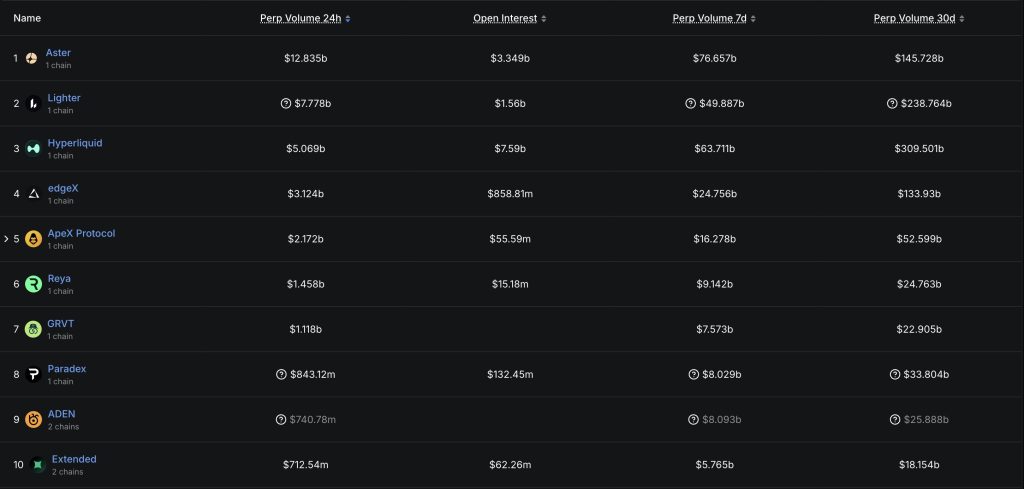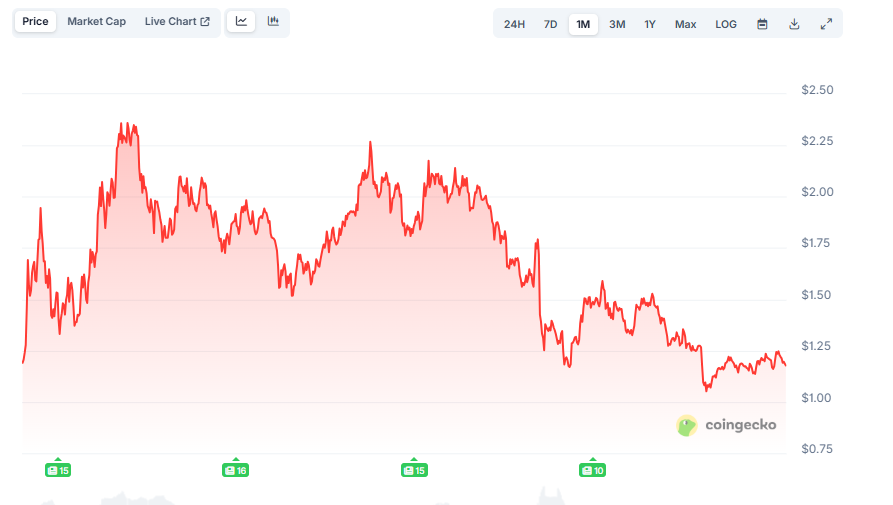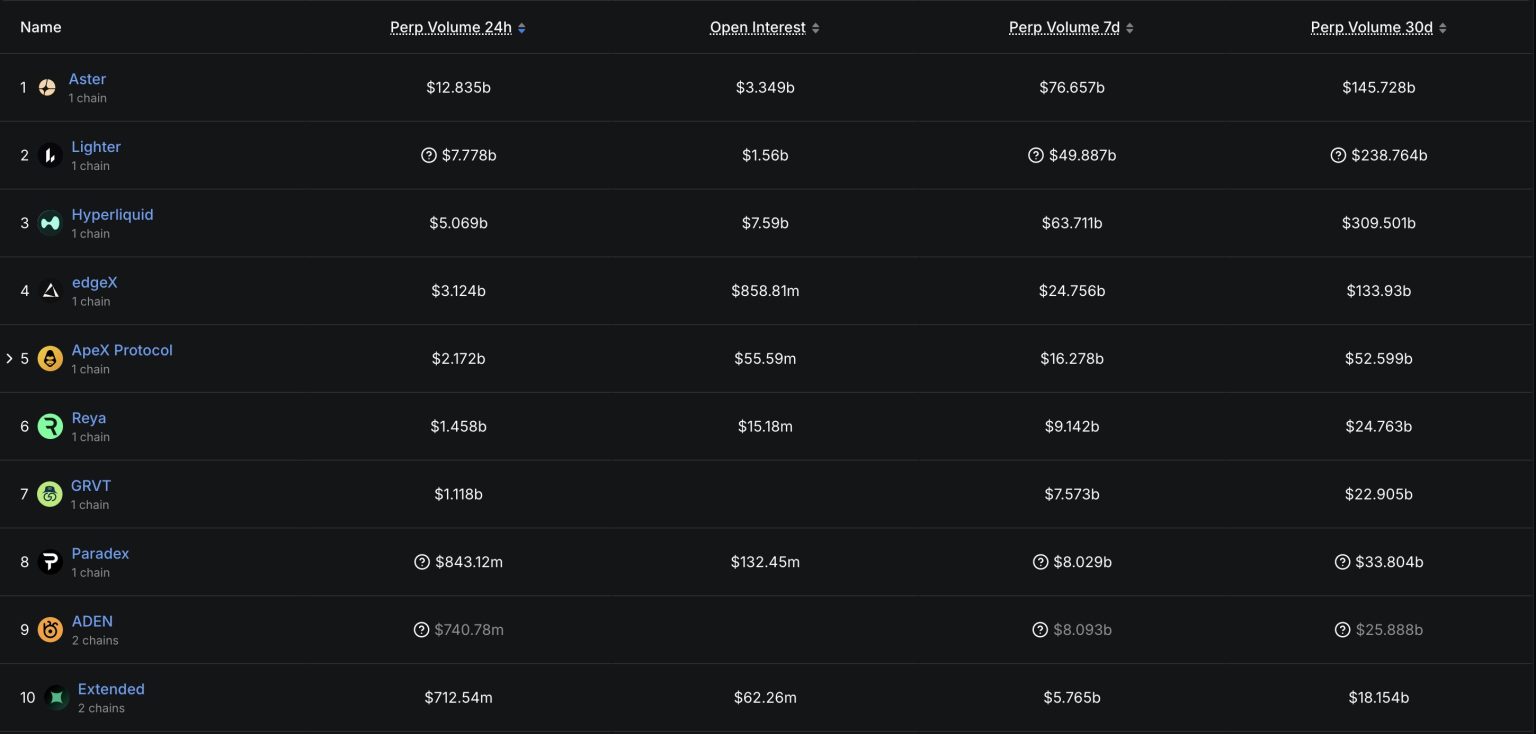
DeFi data aggregator DeFiLlama has quietly reinstated perpetual futures exchange Aster on its analytics platform, weeks after delisting it over concerns about unverifiable trading data.
The relisting has reignited debate over transparency in decentralized markets and the growing influence of data platforms in shaping perceptions of legitimacy.
Aster, a decentralized exchange backed by figures linked to former Binance CEO Changpeng Zhao through YZi Labs, was delisted on October 5 after DeFiLlama detected suspicious trading volumes that closely mirrored Binance’s.
Co-founder 0xngmi said at the time that Aster’s data correlated almost perfectly, at times nearly 1:1, with Binance’s perpetual pairs, such as XRP/USDT and ETH/USDT.
Because DeFiLlama could not access underlying order-level data to distinguish between legitimate trading and potential wash activity, the team decided to remove Aster’s metrics temporarily to preserve data integrity.
At the time, 0xngmi emphasized that the decision was about protecting users who rely on DeFiLlama’s analytics to make investment decisions. “We couldn’t verify the data,” he wrote, noting that the correlation patterns “appeared extreme” across multiple trading pairs.
While neither DeFiLlama nor Aster has provided detailed reasons for the recent relisting, there has been a surge in criticism that the lack of disclosure risks trust in data integrity across the DeFi ecosystem, especially as billions in total value locked depend on accurate metrics.
Aster Silently Relisted on DeFiLlama Despite Ongoing Data Verification Dispute
During Aster’s initial removal, some users accused DeFiLlama of centralization and bias, while others defended the decision as necessary to maintain transparency standards. The controversy showed a recurring issue in decentralized finance; which is how to ensure data accuracy in an ecosystem designed to minimize oversight.
Aster has now reappeared on DeFiLlama, once again leading perpetual trading charts. Dragonfly managing partner Haseeb Qureshi drew attention to the silent relisting on X, noting gaps in Aster’s historical data and the lack of a public announcement.
Responding to him, 0xngmi said DeFiLlama still could not verify Aster’s figures, describing the situation as a “black box.” He added that the team was developing a new framework to include more data metrics but that Aster’s team had requested to be relisted in the meantime.
The decision means Aster’s data is once again visible, though its previous trading history remains fragmented.
For analysts and traders, that gap complicates comparisons of long-term metrics such as market share, cumulative volume, or fee revenue.
In practical terms, the missing data resets Aster’s on-chain footprint, making it difficult to analyze growth patterns or identify trends.
Despite those data gaps, Aster continues to post dominant figures. As of this week, it tops DeFiLlama’s 24-hour and seven-day perpetual trading volume charts, surpassing competitors like Hyperliquid and Lighter.

According to DeFiLlama data, Aster recorded $15.16 billion in 24-hour volume and $3.33 billion in open interest, with $76.65 billion in 30-day trading volume. However, the reliability of those figures remains under scrutiny.
“No Transparency, No Trust”: Aster’s Airdrop Delay Deepens Transparency Rift
Aster’s growing influence in the DeFi space is being overshadowed by mounting scrutiny over its data integrity and communication practices. On October 11, the project postponed its “Genesis: Stage 2” airdrop after identifying “potential data inconsistencies.”
Originally planned for October 14, the event was delayed to October 20 to verify user allocations. The team promised adjustments where necessary, acknowledging user complaints about inaccurate results from its airdrop checker tool.
Community reactions to both the delisting and relisting have been polarized. One user on X, @Pankekkeku, criticized DeFiLlama’s silence, saying that “people only do stuff silently when they know they are wrong.”
Another, @X7H___, said the quiet reinstatement “with no statement, no transparency” reflected hostility toward competition. Others argued that DeFiLlama faces an impossible task in policing fake data, suggesting the better approach is to report available information and let users interpret it themselves.
The controversy has broader implications for the DeFi ecosystem. As more investors depend on third-party analytics to gauge protocol health, questions of accuracy and accountability become increasingly important.
Meanwhile, Aster continues to push ahead with new offerings. The exchange recently announced lower trading fees for all stock perpetual pairs, cutting taker fees from 0.2% to 0.1% and maker fees to zero, and completed a 100 million ASTER token buyback.

Still, the project’s token has fallen sharply, down 18.9% over the past week and more than 40% over the past two weeks, now trading at $1.19, around 50% below its all-time high of $2.41.




